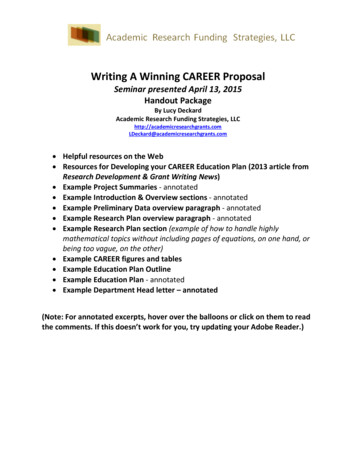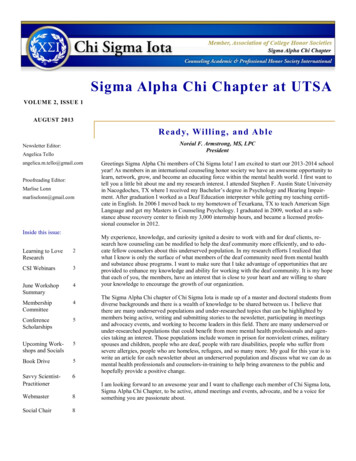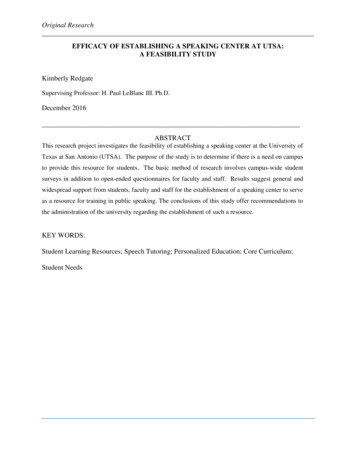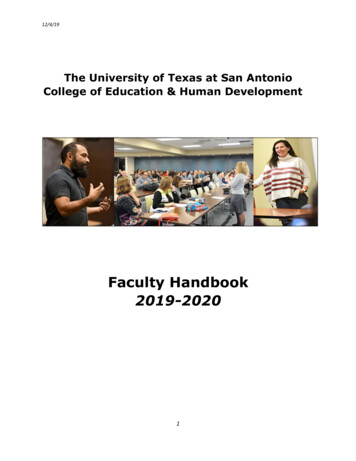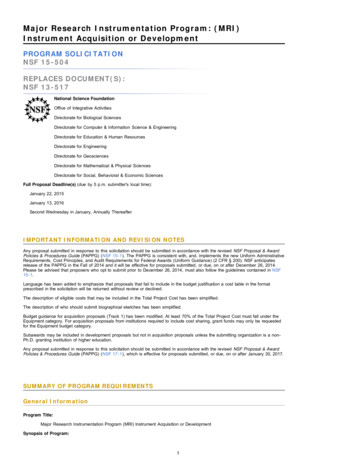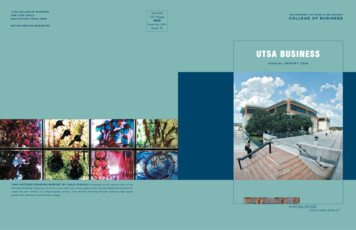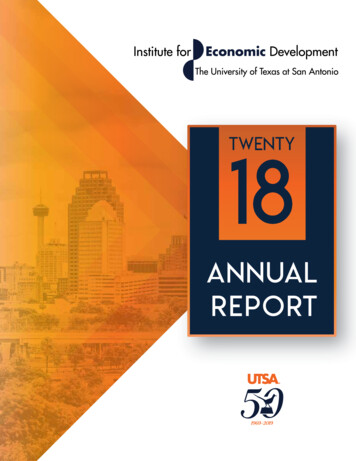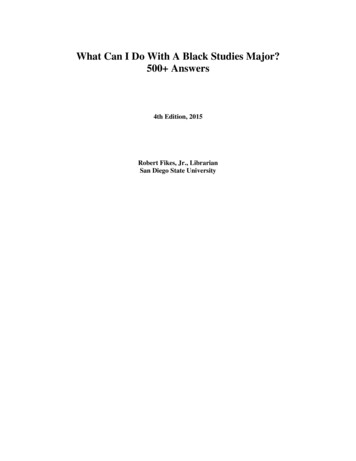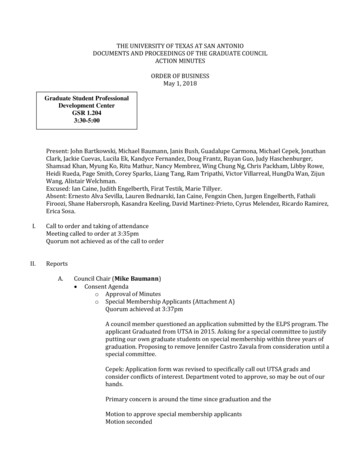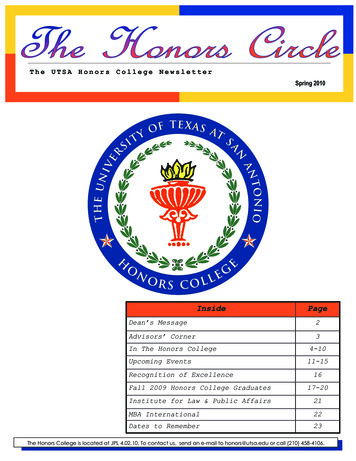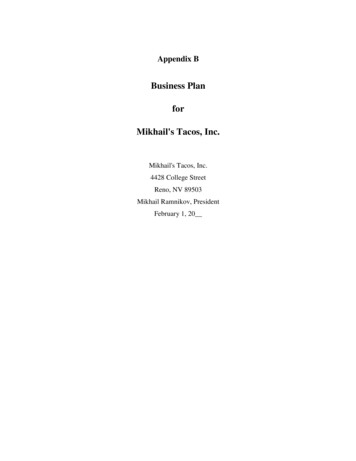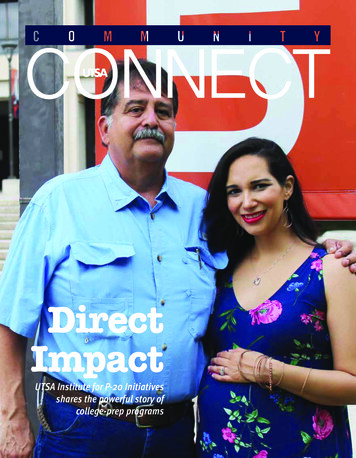
Transcription
DirectImpactUTSA Institute for P-20 Initiativesshares the powerful story ofcollege-prep programs
ii Community Connect 2016
SNAPSHOTSHARING STORIES TO CREATE CHANGEMarlene Rosenboom's story is a testament to the success ofUTSA Institute for P-20 Initiatives' TRiO program. Rosenboomwas the first in her family to attend and graduate college. Hereducational journey inspired both of her siblings, and manyother youth, to study at UTSA.Read the full story on Pg. 20 utsa.edu/communityconnect 1
WelcomeDear Friends,We are pleased to share the fifth issue of Community Connect, aswe provide an insight into UTSA’s daily commitment to serving andengaging with diverse communities locally and across the world.At UTSA, community engagementand service are core values. Our devotedstudents, faculty and staff lead by exampleand take action every day to be civicallyinvolved. Taking leadership to improvethe quality of life of individuals and thecommunity at large is an integral partof who we are and what we do. ThroughCommunity Connect, we proudly sharethe many ways UTSA makes a differenceto the community we serve.Community impact can start with asimple dialogue. “If you can’t talk aboutsomething, you can’t change it,” saidAngelica Docog, executive director forthe UTSA Institute of Texan Cultures(ITC). This year ITC hosted CulturalConversations, a community gatheringthat fostered dialogue with more than300 community members around difficultissues [see “Cultural Conversations” onpage 8].Global economic prosperity can befueled through the innovative applicationof one business model. Read how theUTSA Institute for Economic Development has impacted more than 30,000business owners’ lives and the communities they serve [see “Impact Beyond theNumbers” on page 14].Sharing stories can be a powerfultool for change. This year college-prepprograms nationwide were faced withgrave federal and state budget cuts.The UTSA Institute for P-20 Initiativesadvocates non-stop for the students andfamilies who are directly impacted. P-20brings powerful stories of success toelected officials, foundations and otherinstitutions to champion these valuableprograms. Read the story of MarleneRosenboom, a UTSA and TRiO collegegraduate, and how a college-prep programchanged her life and inspired an entireborder community in South Texas [see“Direct Impact” on page 20].As we begin a new phase in the historyof UTSA, we are committed to continuingto being leaders in community engagement and creating long-term impact. Thisacademic year, the community servicesdivision gladly welcomes a new presidentto UTSA, read more about PresidentTaylor Eighmy on page 5.We hope that you enjoy readingCommunity Connect. We welcome yourcomments and ideas at communityconnect@utsa.edu.Jude Valdez, Ph.D.Vice President for Community ServicesE xecutive editorJude Valdez, Ph.D.DesignCarolina CanizalesVP for Community ServicesUTSA Center for Civic EngagementManaging editorCarolina CanizalesContributing writersUTSA Center for Civic EngagementA ssistant editorsMichael EdwardsUniversity Communications andMarketingMichael MondoUniversity Communications andMarketingHassan ShiraniUTSA Center for Civic EngagementLauren Beaver, JamesBenavides, Jeff Berry, JanisBush, Nicole Chavez, JennileeGarza, Abel Gonzales, Jo AnnJones, Melissa May, AnnePeters, Chiara Pride, LeahRios, Francine Romero, LauraRushing, Lorenzo D. Sanchez,Michelle Skidmore, BennieWilsonA ssociate direc tor ofweb servicesShashi PinheiroUniversity Communications andMarketing2 Community Connect 2016Community Connect ispublished annually bythe Community Servicesdivision at The University ofTexas at San Antonio. Themagazine is dedicated tothe mission of CommunityServices: extending UTSAbeyond its campusesand into San Antonio andSouth Texas through publicservice, outreach andcommunity education. UTSACommunit y ServicesInstitute for Economic DevelopmentUTSA Mexico CenterRobert McKinley, Senior Associate VicePresidentHarriett Romo, Ph.D., DirectorOffice of Extended EducationFrank Salazar, DirectorInstitute of Texan CulturesAngelica Docog, Executive DirectorThe Institute for P-20 InitiativesJoseph Kulhanek, Ph.D., AssistantVice PresidentThe Bank of America Child andAdolescent Policy ResearchInstituteHarriett Romo, Ph.D., DirectorCenter for Civic EngagementBelinda Harmon,Interim Director
Contents14Impact Beyondthe Numbers20 Direct ImpactIED's community impactrelies on client success.P-20 Initiatives sharesthe story of MarleneRosenboom, and advocatesfor college prep-programs.26 Boom, Bust andBeyondCACP rebuilds housing forSouth Texas communities.Departments8 Cultural Conversations12 Building a Healthy Temple16 Monarch Madness18 Engaging the Roadrunner Community in Public Safety28 Awareness to Action32 Engaging Honors StudentsUTSA Institute of Texan Cultures convenes civic gatherings.UTSA college program integrates faith with health.College of Sciences protects endangered butterfly species.UTSA Police Department teaches students valuable life skills.UTSA students learn about social justice issues in San Antonio.Honors College launches new civic engagement program.ON THE COVERUTSA alumna and TRiO program beneficiary MarleneRosenboom and father Rafael Zacarias at the MainCampus.Photo courtesy of Carolina Canizales.Two girls from the 3rd-5thgrade S.T.E.A.M. SummerCamp learn about closed andopen circuits and how theywork together. The goal wasto create one large circuitthat would make mini-fansturn on and off.Photo courtesy of DeborahSillaman Wolfeutsa.edu/communityconnect 3
BriefsMEXICO CENTERSupporting Latino studentspursuing graduate degreesand researchA year after receiving the prestigious Andrew W. Mellon Foundationgrant, the UTSA Mexico Center andthe College of Liberal and Fine Artsfaculty have mentored 12 students toenroll in graduate studies to conductresearch in the humanities.Under the UTSA Mellon Humanities Pathway Program, studentsfrom underrepresented backgroundsreceive one-on-one guidance froma faculty mentor when applying tograduate programs. Additionally,students get in-depth research experiences and participate in professionaldevelopment workshops.“Being a recovering addict, andbeing from a Latino working-classfamily, made the odds impossible forsomeone like me to enroll in graduateschool,” said Matthew Hinojosa, ananthropology and Mexican Americanstudies major, and one of the beneficiaries of the program. “But thelove and community on this campusis real. My mentor and Chicanohistorian, Dr. Jerry Gonzales, hashelped me in my research but also invalidating my work as a brown scholarminority in the anthropology field.”Increasing the diversity ofscholars in the humanities and Latinoresearchers is vital for the changingdemography in the U.S. “Currentlywe see a lot of emphasis in theSTEM fields, and we see an alarmingdecrease of funding and support forthe humanities,” said Olivia Mogollon,program coordinator at the UTSAMexico Center. “This is why studentsin the program represent an underserved community and why theirresearch focuses on the challengesLatinos face today.”This three-year program is set tohelp 36 students, 12 each academicyear. Students enter the program intheir junior year, when they choosea research topic for graduate studiesand participate in seminars toimprove their writing skills. In theirsenior year, students start applying4 Community Connect 2016Top: First cohort of theUTSA Mellon HumanitiesPathway Program visitUniversity of Houstongraduate school.Bottom: MatthewHinojosa at UTSA MainCampus.for graduate programs through theassistance of their faculty mentors.“The faculty that direct thisprogram are beyond helpful,” saidHinojosa. “I had an entire networkhelp me prep for the GRE, writepersonal statements and submit myapplications. I couldn’t have asked formore!”VISIT WEBSITE utsa.edu/mexicocenter
Dr. Taylor EighmyUTSA's Sixth PresidentUTSA welcomes new presidentBy Carolina CanizalesThe community services division at UTSA welcomes PresidentTaylor Eighmy this new academicyear. President Eighmy was thesole finalist for the university’spresidency, and was unanimouslyelected by the University of TexasSystem Board of Regents last June.Eighmy comes to UTSA fromthe University of Tennessee-Knoxville where he created formidablepartnerships in the public-privatesector in his role as vice chancellorfor research and engagement. In2015, he was the principal investigator for a 259 million U.S.Department of Energy grant tosupport the Institute for AdvancedComposites Manufacturing Innovation. The work at the Instituteresulted in national and regional economic development andtechnological innovations aroundadvanced manufacturing.Prior to his role at the University of Tennessee-Knoxville, Eighmyserved as chief research officerat Texas Tech University and theUniversity of New Hampshire.Eighmy obtained his Ph.D. in Environmental Engineering and hisM.S. in Civil Engineering from theUniversity of New Hampshire, andhis B.S. is in Biology from TuftsUniversity.While Eighmy is committedto making UTSA a world-classresearch university, he also recognizes the importance of civicengagement and the role UTSAplays in the San Antonio community. Under his leadership, theUniversity of Tennessee-Knoxvillewas designated a Carnegie com-munity engaged university. Thisachievement compliments UTSA’sCarnegie Community EngagementClassification in 2015, a designation recognizing the university’sdynamic and noteworthy community efforts.Eighmy is passionate aboutshaping UTSA’s future as a greaturban university and Hispanic-serving institution. As anadvocate for experiential learning,strategic government collaborations and public-private partnerships, Eighmy is well-prepared tobring UTSA to the next level ofcommunity engagement.VISIT WEBSITE utsa.edu/presidentutsa.edu/communityconnect 5
Advocateand Empower:EXTENDED EDUCATIONParalegal Program Graduate Gives BackBy Jeff BerryUTSA Paralegal Program graduate LupeDecker uses her career experiences to relateand inspire.The San Antonio native received her paralegal certificate in 1991, and after twenty-fiveyears, Decker continues to return to UTSAeach semester to translate the ebb and flowof her career trajectory to incoming paralegalstudents.A life-long student of advocacy, Decker has found a way to use her passion forempowering others by going back to thegenesis of her academic success. “As a Latina,I learned very early on that education andthe right skill set would be my pathway tosuccess,” said Decker. “I’ve overcome manyobstacles professionally and in those experiences are lessons to share.”Since her completion of the ParalegalProgram, Decker has earned both a bachelor's degree in criminal justice and a master'sdegree in counseling, as well as certificationsin juvenile probation.Immediately after receiving her certificate, Decker began her career in law as aparalegal for a local criminal attorney. Now asa Bexar County Juvenile Probation Officer,Decker contributes her career success to theskills she learned at UTSA, “I truly believe Iwould not have received the opportunities tobe part of state, city and county agencies thatI am honored to have been a part of, withoutfirst starting in the Paralegal Program.” saidLupe Decker helps outUTSA paralegal student.Photo courtesy of JeffBerry.6 Community Connect 2016Decker.In the classroom, Decker shows paralegalstudents how to utilize their new skill setto advance academically and professionally.“The research, case management and writingskills I developed have been my most valuable tools throughout my career,” said Decker. “I want the students to understand thatmany doors will open if they fully commit totheir education.”Although Decker’s purpose is to embolden students, each time she returns, she ishumbled by the students' daily sacrifices.“Many of the students in attendance workfull-time, have children or family responsibilities, and commit long hours studying onthe weekends,” said Decker. “I am honoredevery time I am invited to speak; their levelof commitment inspires me.”The Paralegal Certificate Program isdesigned and taught by local, practicing attorneys to prepare students to be knowledgeable, ethical, and effective while emphasizinglegal areas where paralegals are most indemand. “The presence of Lupe strengthensour mission,” said Gloria Brownell, ParalegalProgram coordinator. “She is a constantreminder to our students that success hasmany avenues.”VISIT WEBSITE utsa.edu/ee
Speak Up, SACOLLEGE OF PUBLIC POLICYCity partners with COPP to gather citizens’input on budget prioritiesPhoto courtesy of SA Speak UPBy Michelle SkidmoreIn 2016, for the second year in a row, the City of SanAntonio (COSA) renewed its annual SA Speak Up Project. Theproject aims to collect demographic information from local residents regarding their personal use of city services. Feedback iscritical to the city’s budget process. SA Speak Up plays a role indefining budget priorities for city council.Last year, in partnership with the UTSA College of PublicPolicy (COPP), COSA collected data from more than 5,000 residents through community outreach efforts and email surveys.According to a report by Jeff Coyle, director of governmentand public affairs for the City of San Antonio, the 5,000 participants mark a 62 percent increase in participation compared to2015.Bilingual teams from COPP and COSA attended eightcommunity-wide events during the months of April and May,2016, with an informational booth to make surveys availableto residents. In addition to personally collecting surveys, students emailed close to 1,000 respondents and received close to800 responses back. With the college’s help, the City of San Antonio was able to reach a wider audience for providing feedbackon topics locals would like to see receive more budget support.Residents told their City that their highest priorities werestreets, sidewalks, and infrastructure. As a result, the Cityallocated 64 million for streets, 15 million for sidewalks, and 2 million for pedestrian safety initiatives.With the help of a razor-focused digital campaign and bilingual street teams, the City was able to ensure that underrepresented demographics were better informed."This partnership helped students better understand thebudget process and made their classroom experience moredynamic," said Megan Dodge, adjunct instructor at UTSA. “TheCity's budget priorities should be a reflection of the community and the City Council.”VISIT WEBSITE SASpeakUp.comutsa.edu/communityconnect 7
Left: Rev. Ann Helmkewelcomes guests to CulturalConversations. Helmke,recently named theCity’s liaison to religiousorganizations, conductstalking circles and communitydiscussions through her workwith the peaceCENTER.Helmke helped facilitate oneof the talking circles, as wellas laying out the ground rulesfor productive and thoughtprovoking conversations.Right: CouncilmanRoberto C. Treviñoleads a conversation on“City by Design.” As acouncilman and architect,his discussion touched onmobility, gentrification,historic preservation,and other topic areasimagining the San Antonioof the future.CulturalConversationsBy James BenavidesThe UTSA Institute of Texan Cultures’ mission statement reads, “Wegive voice to the experiences frompeople across the globe who call Texashome, providing insight into our past,present and future.”When a wave of anti-Semiticvandalism targeted a predominantly8 Community Connect 2016Jewish neighborhood on San Antonio’sNorth Side, elected officials for CityCouncil District 8 and State SenateDistrict 26 created a “Cultural Conversations” program inviting communitiestogether to discuss the difficult issues:race, religion, cultural differences,challenges, myths and misconceptions.The Institute has hosted two of thesegatherings, each drawing more than300 attendees to join in the conversation circles. The first in September2016, included topics that rangedfrom culture and media to financialliteracy and discussion about CityCouncil decisions. The more recentevent, hosted March 27, 2017,focused on San Antonio’s refugeecommunity, with discussions thatcentered on vanquishing misconceptions, understanding the value refugee entrepreneurs have brought to thelocal economy and learning about thecrises that transform everyday peopleinto refugees.“The Institute has been called ‘aforum for the understanding and appreciation of Texas and Texans,’” saidAngelica Docog, executive director at
If you can’t talkabout something,you can’t change it.It’s our obligation asresponsible citizensand as a public forum to facilitate programs like CulturalConversations."-Angelica DocogExecutive Director, ITCthe museum. "Cultural Conversations isthe perfect example of that statement inaction. This event perfectly fits ITC's mission and it has been a pleasure hostingand participating in the sessions here.”City-wide, there have been four Cultural Conversations events, with the firstsession at the San Antonio Zoo servingas a sort of a cultural exchange with various communities, such as Sikh, Muslimand Jewish, attending. The second was inSeptember 2016 at the Institute. It highlights ITC's Texas Star Heritage Awardrecipients, who led some of the conversation circles in their areas of expertise.Another session followed shortly afterthe 2016 election, then the Institutehosted the fourth session in March 2017as an extension of the Catholic Charities“Foreign by Land, Native by Heart” exhibit which was showing at the time.Cultural Conversations is designedto support dialogue, with conversationleaders offering short introductions andkeeping participants on-topic. Guestscan move from subject to subject basedon their interest; per the event’s groundrules, they are responsible for their ownexperiences.“What’s so amazing is the report-outprocess,” said Ann Helmke, co-founder ofthe San Antonio peaceCENTER, who coordinated and advised on the programs.“When the groups reconvene as a singleaudience at the end of the event, we hearfrom international students, refugees,minorities and everyday people, deeplyimpacted by the stories shared and discussions within the groups. We set out tomake a change in the community and it’shappening.”Event organizers hope that havingexperienced Cultural Conversations,guests will host similar events in theirown communities: schools, neighborhood associations, college dorms, placesof work, churches, civic organizations,scout groups and other gatherings. Tothat end, each guest receives a copy ofthe Conversation Circle Golden Rules,a simple handout which sets the basicground rules for conversations on difficult subjects.“A few years ago, the Institute hostedan exhibit on race as a social construct,”said Docog. “One of the concepts thatcame from that is that if you can’t talkabout something, you can’t change it. It’sour obligation as responsible citizens andas a public forum to facilitate programslike Cultural Conversations. It’s the purest form of ‘giving voice to experiences’that I’ve ever seen.”VISIT WEBSITE texancultures.comutsa.edu/communityconnect 9
Pictured are students atBoldt Elementary receivingthe 4th grade curriculum,“JA - Our Region.” The 4thgrade students are learningabout entrepreneurshipand how entrepreneursuse resources to producegoods and servicesin a region. JuniorAchievement studentsoperate a hypothetical hotdog stand to understandthe fundamental tasksperformed by a businessowner and to see howmoney comes into and goesout of a business.Photo courtesy ofBernadette Byrd.10 Community Connect 2016High-impact program forUTSA business studentsCollege of BusinessFor 15 years the UTSA College of Business has been a leading advocate of student service learning through its innovative partnership with Junior Achievementof South Texas (JAST).Junior Achievement is the largestinternational nonprofit organizationdedicated to educating students in gradeskindergarten through high school on business subjects affecting their personal a
UTSA Paralegal Program graduate Lupe Decker uses her career experiences to relate and inspire. The San Antonio native received her para-legal certificate in 1991, and after twenty-five years, Decker continues to return to UTSA each semester to translate the ebb and flow

